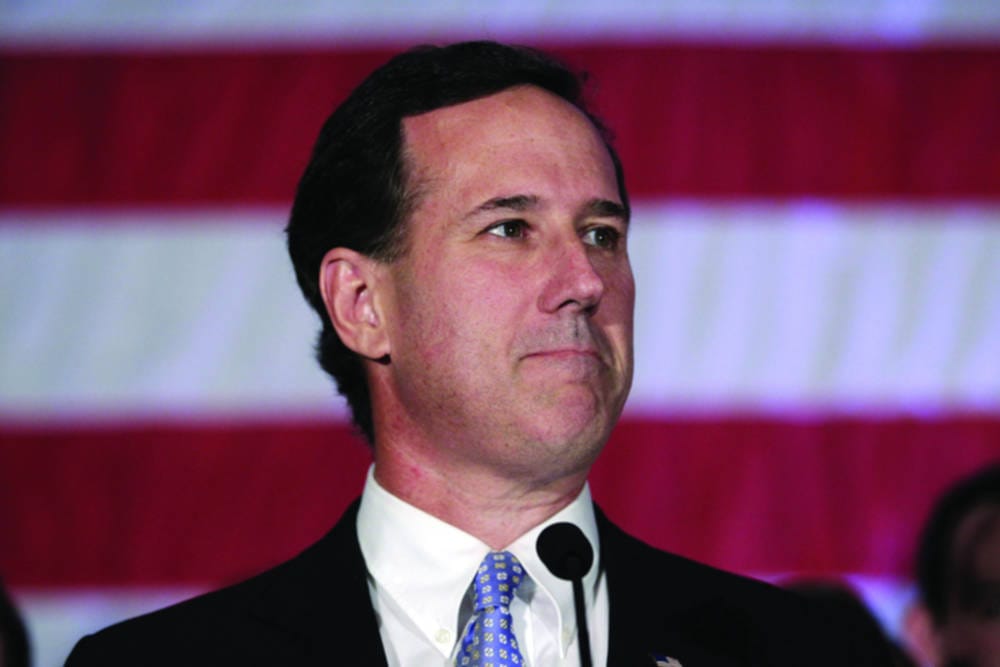Santorum’s queer ideas
Rick Santorum... more queer than a strangely frothy mixture

Those of you who aren’t following the United States presidential race may not be familiar with Rick Santorum. In order to save you time and limit my own personal biases, I will impartially copy and paste the Wiktionary definition for Santorum:
“Santorum (noun, uncountable) – A frothy mixture of lubricant and fecal matter that is an occasional byproduct of anal sex. [from 21st c.]”
Okay maybe it’s not impartial, but it is the Wiktionary definition for Santorum.
More specifically, Mr. Santorum was the republican candidate who managed, for the past few months, to continually rain on Mitt Romney’s presidential parade. He won a number of primary elections and positioned himself as a serious contender in the 2012 election. Santorum has recently dropped out of the race, but his prolonged viability as a presidential candidate is too curious to ignore. Here is a quick fly by of his views.
During a speech on the election trail regarding higher education Santorum addressed the crowd: “President Obama said he wants everybody in America to go to college… What a snob.” God forbid, in an increasingly competitive global world, that Barack Obama would like the young adults of America to avail themselves of the university system.
Santorum is against abortion in all cases, including rape. His argument? “The right approach,” he said, “is to accept this horribly created, in the sense of rape, but nevertheless, a gift” [sic]. Despite this defense for the sanctity of life, he is still in favour of capital punishment.
Most controversial are Santorum’s views on homosexuality. He opposes openly gay men and women serving in the military based on what he claims is in the best interest of national security. Surely if homosexuals were allowed to serve openly, American military might would soon be reduced to Elton John and pillow fights. He justifies his platform semantically, claiming that military service is not a right, but a privilege – a privilege, of course, to which only us heteros are entitled.
When asked to justify his opposition to gay marriage, Santorum’s rationale was that no reasonable line could be drawn to limit the inevitable influx of atypical marriages. “You can imagine all the different types of marriage that would happen,” he said at a town hall meeting. Extending my imagination to its limits, I can only come up with a few far-fetched ideas. Santorum on the other hand is much more creative about the “likely” consequences of relaxed constraints on traditional marriage.
Toward the end of his candidacy Santorum found himself clarifying a statement he made during an interview in April 2003 during which he stated: “In every society, the definition of marriage has not ever to my knowledge included homosexuality. That’s not to pick on homosexuality. It’s not, you know, man on child, man on dog, or whatever the case may be. It is one thing.”
Political commentators have since cited this sound bite as evidence that Santorum equates homosexuality with bestiality and paedophilia – an allegation that he forcefully denies, emphasizing that he specifically excluded homosexuality from those other things.
No, he didn’t explicitly equate them. But why was he talking about them together in the first place? Cognitive psychology conceives of the mind as a web of nodes and links. Nodes represent objects or concepts and links represent the strength of the association between different nodes. When a given node is activated electronic impulses are triggered that activate other nodes thereby leading us to recall certain concepts that are, in our minds, associated. For instance, when I say renaissance painter you may think of Leonardo da Vinci. When I say footballer you may think of David Beckman.
When I say Rick Santorum you may think of an unsavory frothy mixture.
By distinguishing homosexuality from bestiality and pedophilia Santorum manages to give us a sneak peak into how his mind actually works. Boiled down and bereft of the subtle nuances of language that he uses for his defense, Santorum’s moral persuasion is clear. To him homosexuality, bestiality and pedophilia are ultimately – to invoke the misused lingo of right-wing fundamentalists – abominations.
Santorum is a Catholic fundamentalist, and his bigoted ideas are based on the teachings of the bible. Today many of the faithful take a more flexible interpretation of the holy book, viewing it as malleable and understanding that its message is partly obscured by translation and the passage of more than 2,000 years. Sure you can find quaint wisdom in the bible, but is it a singularly reliable source for answers to significant moral questions? Is the book that prescribes death for not observing the Sabbath a tenable moral compass for the 21st century? Why are we seeking answers from people who didn’t have toilet paper?
Vestiges from the past manage to linger. The arguments against The Civil Rights Act of 1964 weren’t dissimilar to those being levied against the gay-rights movement today. In an interview with Chris Wallace, Mr. Santorum was asked if the following quote dove-tailed with his rationale behind why homosexuals should be excluded from military service: “The army is not a sociological laboratory. Experimenting with army policy… would pose a danger to efficiency, discipline and morale and result in ultimate defeat.” When Santorum agreed that this quote sounded about right, Chris Wallace revealed its narrator, Colonel Eugene Householder, who was arguing against racial integration in the military.
In 2012, what are we doing debating these things? Will our children not look back and find these debates as senseless and as bigoted as we now perceive those regarding racial integration to have been? What’s does Santorum’s viability as a presidential candidate say about our society?





